The Knockhall Primary Curriculum
At Knockhall Primary School we are very proud of our bespoke curriculum which is linked to the Early Years Framework and National Curriculum. We have designed our own curriculum taking History, Geography and Science as the main drivers in our topic approach. In addition, we have devised our own Computing, Art/DT, Personal Development, EGPS curriculum.
Our topics are led by core texts – high quality texts that link between the subjects.
Our curriculum is mapped out to ensure that learning is sequential and iterative so that children can make contextual and purposeful links as they continue through their primary journey. The curriculum delivers progressive knowledge and skills across each subject area and with pupils experiences we are able to reinforce this learning through trips and visitors on our Big Bang Days and at other times in the year.
As our curriculum is mapped out, our teachers are able to take the time to develop their medium and short term plans ensuring that the teaching and learning delivery is engaging and ambitious whilst considering a universal design for learning approach and adaptive strategies are in place.
Greenhithe and the surrounding area is rich in local history, as well as areas of geographical interest. As a school we strongly believe that our children should be aware of this in order to develop a love for where they live. We also want them to understand how where they live, fits into the locality, e.g. Greenhithe, London and beyond. Each theme therefore looks at local impact, impact in London, the wider UK, and where appropriate, across the World.

Every topic starts with a ‘Big Bang’ in order to capture the children’s curiosity, and finishes with a Family Learning Afternoon to share their published work and learning through the topic. Once a term, we invite parents and carers in to come and explore their child/ren’s learning with them.
After the Big Bang, the children’s perspective on what they want to learn is gathered (’gateway to learning’), and this will influence the ‘discover and explore’ section of the topic.
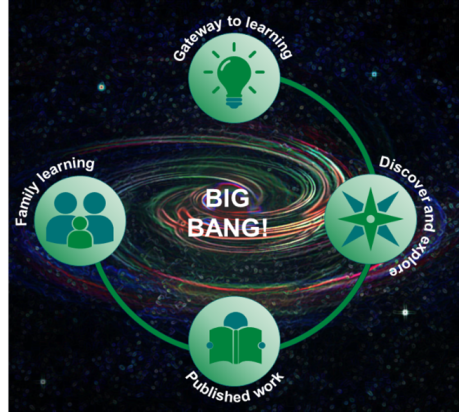
Intent
At The Woodland Academy Trust, the curriculum is designed to: recognise children’s prior learning, provide first hand learning experiences, allow the children to develop interpersonal skills, build resilience and become creative, critical thinkers for now and in the future. We have high ambitions for all of our learners, providing equality of opportunity for all, with no pupil being at a disadvantage due to their background, additional learning requirements, disability, race or ethnicity. We achieve this by adopting a universal design for learning approach, using technology across our academies.
Every child is recognised as a unique individual. We celebrate and welcome differences within our school community, and embrace diversity in all its forms. The ability to learn is underpinned by the teaching of basic skills, knowledge, concepts and values, in a sequenced way.
We constantly provide enhancement opportunities to engage learning and believe that childhood should be a happy, investigative and enquiring time in our lives where there are no limits to curiosity and there is a thirst for new experiences and knowledge.
We use our personal development curriculum to promote positive attitudes to learning and wellbeing which reflect the values and skills needed to promote responsibility for learning and future success.
Children leave our Trust with a sense of belonging to a tightly knit community where they have the confidence and skills to make decisions, self-evaluate, make connections and become self-regulated learners, able to manage their emotions and take care of their wellbeing.
Community involvement is an essential part of our curriculum as we celebrate and learn about the local area and traditions, learning new skills to enable the children to take an active role in events throughout the year.
The Woodland Academy Trust teaching and learning model is linked to Rosenshine’s Principles and the use of Teaching Walkthrus by Tom Sherrington and Oliver Cavglioli. Our curriculum is bespoke to our Trust and is linked to Early Years Framework and National Curriculum.
Implementation
Our curriculum seeks to provide its pupils with a variety of opportunities to enhance their learning, e.g. through the use of guest speakers within the local community, educational visits and workshops. We have a clear strategic vision for curriculum implementation which prioritises quality in a variety of teaching styles and experiences with the aim of fostering the enjoyment of learning among pupils, using educational technology as a key delivery partner.
Woodland Academy Trust ensures that all of its academies provide equal opportunities for all pupils by making informed decisions based on the learning requirements of each individual; teaching staff will gauge the needs of each pupil through observation and assessment, and adapt their learning styles and requirements in order to identify how our curriculum can enhance each pupils’ learning and help them to excel.
Our teaching staff participate in a range of CPD activities to enhance their subject knowledge and understanding of how to support their pupils, both academically and emotionally.
We offer a curriculum which enables pupils to be creative, literate and academic through a range of core and non-core subjects which are interwoven with cross-curricular links wherever it is possible to do so, with all schools following the same curriculum architecture.
Impact
With a varied, rich and stimulating curriculum, our schools benefit the lives of all pupils by providing them with the teaching, resources and educational experiences to help them to achieve the best possible outcomes. We ensure that teaching staff are equipped with the tools, skills and knowledge they need to make the intended impact a reality.
The impact of our curriculum means that pupils have enhanced their aspirations and confidence in their abilities. Our pupils are motivated to succeed and achieve their goals, while many exceed these goals.
All of our pupils finish each key stage equipped with the tools they need to succeed in their phase of education or employment, and due to our ever-changing world, we aim for our pupils to leave us as active citizens of change.
We expect that the vast majority of our pupils will have achieved the expected standard for them at the end of each KS and that all of our academies sit at an Ofsted grading of at least good.
How the effectiveness of our schools’ curriculum is evaluated
We expect all of our academies to be able to explain how they are achieving our core curriculum aims; in addition, we look at data which helps to determine the impact of our curriculum and whether this aligns with the desired impact across all of our academies.
To gauge an in-depth understanding of the impact of our curriculum, we look at the following:
· Assessment data
· Attendance data
· Behaviour data
· Attendance at extra-curricular clubs
· Formative evaluation of pre-planned aims and whether these aims have been achieved
· Stakeholder voice
EYFS
Our EYFS settings offer a curriculum which prioritises children’s personal, social and emotional development, physical development and communication skills.
Our early years settings provide stimulating activities which enable children’s creativity and curiosity to flourish during this stage of education; children develop firm foundations on which the remainder of their education is based.
We ensure that children receive a stimulating curriculum which helps them to develop:
· Confidence in their ability.
· Social skills.
· Emotional consciousness of themselves and the people around them.
· Basic problem-solving skills.
· Their personal character.
KS1 and KS2
At KS1 and 2, our academies aim to equip pupils with the knowledge and skills they will need for the transition in to KS3.
Pupils will cover a range of subjects and topics which seek to aid the development of each pupil’s creativity, literacy, numeracy, scientific knowledge and technical skills.
Additionally, pupils will begin to learn more about themselves and the people around them through the teaching of personal development.
Phonics
Our phonics curriculum follows the clear systematic approach set out in Little Wandle Letters & Sounds. Key skills are developed through the Review, Teach, Practice, Apply teaching structure.
Early Reading
At Woodland Academy Trust, children are taught to use phonic knowledge and skills as the route to decode words, alongside language comprehension processes (our ability to acquire and understand vocabulary).
Reading Schemes
At Woodland Academy Trust, we use books matched to the children’s secure phonic knowledge using the Little Wandle Letters and Sounds Revised assessments and book matching grids. Our chosen reading scheme is Collins Big Cat for Little Wandle Letters and Sounds. The decodable reading practice book is used to teach reading in school and is taken home to ensure success is shared with the family.
Whole-Class Reading
When our children are secure with all the phases within our phonics scheme and can apply this in their reading, they are taught to read books that are not fully decodable. These books are high quality texts, covering a range of literature types seen in fiction, non-fiction and poetry across each half term. At the Woodland Academy Trust, we enhance learning in the wider curriculum by linking the books that are studied during these lessons to topics learnt in geography, science and history. This may include core texts, which can be found in each school’s curriculum handbook. We ensure that the content domains from the National Curriculum are taught through this approach. The Woodland Academy Trust also draw on strategies from Just Imagine’s Take One Book programme, to ensure that learning is engaging and relatable to pupils.
Reading for Pleasure
We are committed to developing our Reading for Pleasure pedagogy and are committed to ensuring that children’s experiences of reading are enriched through commitment to well-resourced library areas and book corners. Our aim is to build a community of readers.
Writing
Our writing curriculum aims to enhance topical learning through the use of core texts and teaching draws upon the EEF Improving Literacy Recommendations and Talk for Writing principles. The writing process is constantly adapted to meet the needs of the children in our schools. There is a culture of writing for a range of purposes to best prepare our children for the world beyond primary school. Children are taught to formulate and articulate increasingly sophisticated sentences as well as having regular opportunities to develop quality vocabulary and language choices. We provide regular opportunities to apply their writing skills in extended quality pieces of writing.
Oracy/Spoken language
Our children are taught to speak clearly and convey ideas confidently using Standard English. They learn to justify ideas with reasons; ask questions to check understanding; develop vocabulary and build knowledge; negotiate; evaluate and build on the ideas of others; and select the appropriate register for effective communication. They are taught to give well-structured descriptions and explanations and develop their understanding through speculating, hypothesising and exploring ideas. This enables them to clarify their thinking as well as organise their ideas for writing.
Vocabulary development
Acquisition and command of vocabulary are key to learning and progress across the whole curriculum. Teachers develop vocabulary actively, building systematically on their children’s current knowledge. They also make links between known and new vocabulary ensuring the children expand the vocabulary choices that are available to them when they write. Vocabulary is explicitly taught in all curriculum areas.
EGPS
We have developed our very own bespoke Grammar, Punctuation and Spelling curriculum. Each year group covers key aspects linked to the National Curriculum starting with a ‘ready to write’ lesson and culminating in consolidation of learning opportunities. Each year group has a clear long-term overview which covers progression of grammar and punctuation skills. Our bespoke curriculum sets out the knowledge that children should learn for each GPS skill in each year group, including model questioning and ideas for teaching the content.
Handwriting
At Woodland Academy Trust, we follow the Improvement in Schools through Handwriting and Art (ISHA) approach to handwriting. Systematically following the programme ensures that letters are correctly formed, and joins are taught once pupils are secure with letter formation. The style is semi cursive with no loops or lead ins.
Mastering maths means children are acquiring a deep, long-term, secure and adaptable understanding of the subject. We believe and adhere to the following principles to help our children have a secure understanding of maths, using White Rose Maths as the core delivery tool for this.
Coherence
Lessons are broken down into small, connected steps providing access for all children and leading to the ability to apply the concept to a range of contexts.
Representation and Structure
We use concrete resources and pictorials to make maths visual so children can see and manipulate it. Concrete maths resources are objects that can help children see maths. For example, “five apples” and “half of a pie” are concrete numbers, while “five” and “one half” are abstract numbers.

In every maths lesson, teachers model how to use precise maths language to explain mathematical thinking and encourage children to discuss their ideas and thinking while they explore maths concepts. Teachers encourage children to share their thinking to deepen their understanding of a maths idea by questioning; for example: What have you discovered? How did you find that out?
Fluency
Quick and efficient recall of maths facts, for example, number bonds to 10 (numbers that add up to make 10), times tables, days of the week, and months. Each year group has a daily ‘maths meet’ which helps support the development of fluency.
Variation
The teacher represents the concept being taught, often in more than one way, to draw attention to a particular idea and develop an overall understanding. We encourage children to pay attention to what is kept the same and what changes, connect the mathematics and draw attention to mathematical relationships and structure. For example, if I know 2 + 2= 4 then 12 + 2 =?
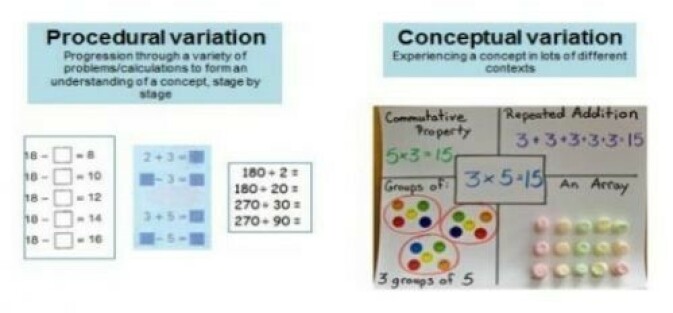
The diagram below shows how the steps above link and weave through to build children’s understanding and enable them to understand, apply and eventually master the concepts of mathematics (NCETM).
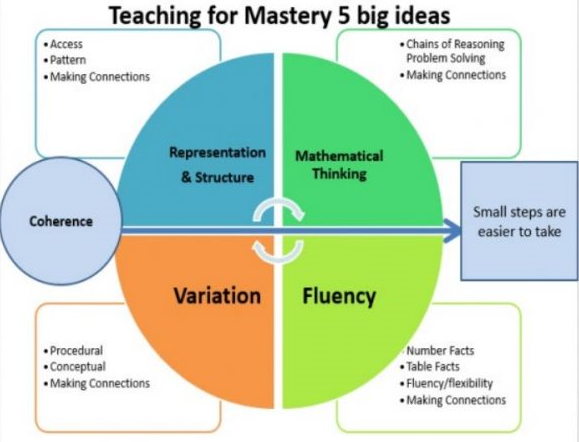
Teaching Calculation
Please see the attached documents for how we approach the teaching of calculation
WRM Calculation Policy 2024 All Year Groups
At Knockhall our vision for science is to provide a progressive curriculum to enable our children to explore and discover the world around them and will provide the foundations for understanding the world through the specific disciplines of biology, chemistry, and physics. Through building up a body of key foundational knowledge and concepts, pupils are encouraged to recognise the power of rational explanation and foster their sense of excitement and curiosity about natural phenomena, understand how science can be used to explain what is occurring, predict how things will behave, and analyse causes.
They are encouraged to able to draw conclusions based on their data and observations from practical activities, using evidence to justify their ideas, presenting them in a systematic, scientific manner, incorporating iPads (programmes including Numbers, and cameras to record their findings) using pupil voice, diagrams, graphs, and charts.
History is taught in a cross curricular manner with key knowledge identified for each year group. The teaching of skills and knowledge progresses through each year group to ensure children are given opportunities to build upon and achieve each skill and develop an understanding of the chronological development of British and world history. Explicit links to prior learning and key vocabulary are identified for each topic enabling pupils to make connections and extend and consolidate their knowledge.
At Knockhall, our intent is that children develop a holistic understanding of the past and see the ‘big picture’ of history. We develop a sense of chronology through in depth extended chronological studies which enable pupils to explore the past, developing their own historical curiosity and understanding of why the past can be interpreted in different ways. They learn to challenge their own and other’s views and preconceptions through appropriate and accurate historical enquiry; with the diverse range of cultures in our community, we aim to build the cultural capital of our pupils – the role of women and people from different backgrounds are embedded in the curriculum. History and culture are inherently linked and we have reflected this in our planning.
WAT History disciplinary knowledge
KHP History Substantive Knowledge 23 24
KHP History Substantive Knowledge 24-25
At Knockhall, we see Geography as an integral part of the curriculum as it provokes and answers questions about the natural and human worlds; it is about understanding the diverse places, people, resources and natural and human environments of our world, together with an understanding of the Earth’s key physical and human processes. The curriculum at Key Stage 1 focuses on developing children’s understanding of geography: subject-specific vocabulary relating to human and physical geography and geographical skills, including first-hand observation, to enhance their locational awareness. In Key stage 2, pupils extend their knowledge and understanding and develop their use of geographical skills; they enhance their locational and place knowledge, including the location and characteristics of significant human and physical features around the world.
The teaching of skills and knowledge progresses through each year group to ensure children are given opportunities to build upon and achieve each skill and develop an understanding of geography. Explicit links to prior learning and key vocabulary are identified for each topic enabling pupils to make connections and extend and consolidate their knowledge.
Technology in Education
At the Woodland Academy Trust, we strive to make sure all children are equipped with the digital education that they need for the future. We use technology to foster creativity, confidence, and collaboration, as well as to remove individual barriers to learning, allowing all children to realise their full potential in a way best suited to them.
Computing Curriculum
Throughout Y1, children are taught how to use all the functions of an iPad correctly and independently. Through basic tools such as accessibility features, children learn how to personalise their own learning experience to tailor the way they interact with digital devices. From Y2 onwards, children continue through our bespoke computing curriculum to develop essential skills across a range of themes, including e-safety, digital literacy, coding, and design. These themes are revisited every year to allow students to enhance and develop their skills and knowledge whilst using a range of devices, applications, and operating systems.
Each Autumn, children complete a unit around online safety which is revisited each half term as part of our safer online relationships education lessons. Our coding and design units provide children with the skills required to move from basic algorithms and presentation platforms, to advanced coding and designing and developing their own applications.
Technology Across the Curriculum - Universal Design for Learning
At Woodland Academy Trust, we utilise technology to allow all children to experience success.
Children are provided with access to a variety of mediums in which they can demonstrate their learning, from sending a voice note, to making a short film or presentation, or simply to write in their book. By providing children with options, they are able to engage with and demonstrate their learning in a way most suited to them. This removes the need for any child to feel isolated from a task or unable to achieve.
We carefully design lessons to focus on the key areas of learning. Using Showbie as an online interactive platform, teachers can easily send out documents for children to interact with and quickly return for personalised feedback. This is directly linked with Socrative – an online assessment tool which quickly allows teachers to address misconceptions, and identify any targeted intervention. Augmented Reality applications are used to provide children with engaging interaction with 3 dimensional objects in the classroom, and features such as Apple Maps allow children to understand their place as a global citizen in context with their own community.
WAT Computing overview - Substantive and Disciplinary Knowledge
At Knockhall Primary School, we use the Bexley Agreed Syllabus in Y1 to Y6. The syllabus is based around a key question approach, addressing three strands across each year group – believing, expressing and living, and sets out the suggested content for learning for each key question. If a particular religion is followed by a child in the class which is not included in the syllabus (for instance being a Sikh or a Jehovah’s Witness), then the syllabus can be adapted. In EYFS, RE is interweaved throughout their topics, and does not follow the Bexley Agreed Syllabus.
Throughout the teaching of Religious Education at Knockhall Primary, children will have the opportunities to gain knowledge of how others live their lives, and it will equip them with the appropriate understanding to demonstrate respect for themselves and others as people with their own opinions, rights and social belonging. During our teaching of RE, we will incorporate some or all of the following: the use of religious artefacts, visits to places of worship, visitors to the school from different faiths, teaching approaches that promote Religious Education skills and a variety of ways for children to record their learning experiences.
Each year group has a weekly timetabled Personal Development lesson. Across a half term, the Personal Development lessons incorporate all of the statutory PSHE requirements following the Skill Builders system set out by the PSHE Association, the national association for PSHE education professionals.
Under the umbrella of Personal Development, we also deliver Character Education lessons using the 6 WAT Characters. Additional lessons are planned during this time to encourage discussions around the fundamental British Values, and our role in the community and as a global citizen.
Personal Development Substantive and Disciplinary Knowledge
At Knockhall, our Art, Design & Technology (DT) curriculum seeks to captivate, motivate and stimulate lifelong creative learning, through a clear progression of both knowledge and skills. Over the course of the year, children will be looking at a range of artists, designers, architects, craftsmen and women throughout history as a reflection of culture, creativity and diversity.
The Art and DT curriculum has been carefully linked to each year group's half term topic so children can make connections with their learning, building on prior knowledge and skills, adding to what they already know. In Art, our children will have regular opportunities to engage with different mediums such as sketching, painting, sculpting, printing and working with digital media. Similarly in DT, children will learn to be resourceful, innovative, enterprising and problem-solving citizens, following the design, make, evaluate process. Where possible children will deepen their understanding through cross curricular activities and real-life experiences.
The Art and DT curriculum aims to develop children’s confidence to explore and express themselves through different art and design forms. Children will be able to develop critical thinking and analysis skills, by accessing a curriculum that is adapted and developed; every child achieving their full potential through interpretation
Art Disciplinary and Substantive Knowledge Progression
DT Disciplinary and Substantive Knowledge Progression
Our Physical Education curriculum provides opportunities for pupils to enjoy, experience, share and excel in quality P.E lessons. Our curriculum offers physical education lessons that inspire all pupils to develop a yearning for regular physical activity, being physically active and healthy to develop stamina, speed, flexibility, agility and strength. We use P.E passport to support the delivery of P.E and lessons offer opportunities to inspire team work, fair play, and respect through experiencing both winning and losing. Through P.E, our aim is for our pupils to develop confidence and competence in a range of skills and games that allows them to develop into physically active individuals who would like to continue participating in later years. We also aim to provide opportunities for pupils to participate in a variety of competitive sports to show a desire to improve and achieve their highest skill levels relative to their capabilities and potential.
PE Substantive and Disciplinary Knowledge
School Games Mark
At Knockhall, we are proud of our PE and Sports provision. Having acheived the SILVER School Games Mark Award in 2022, we are now working hard to achieve Gold.
The School Games Mark Award is a government led award scheme launched in 2012, facilitated by the Youth Sports Trust to reward and recognise school's engagement in the School Games against a national benchmark and to celebrate keeping young people active.
We are very proud of our pupils for their dedication to all aspects of physical activity and school support. As a school, we are committed to using the School Games to engage those who have not previously been active or had the chance to represent our school in order to try and ensure that all pupils have a positive experience and want to try a new activity - in school and beyond, in our community.
In order to achieve the Schools Mark Award, our school had to fulfil criteria in the areas linked to the five School Games outcomes and we are delighted that this hard work has been recognised and continues to grow. Next step - Gold!
We teach Spanish to all of our children in Key Stage Two (from year 3 and above). A majority of the learning takes place through Language Nut App which the children find interactive and engaging.
Our intent is to provide broad linguistic and cultural experiences for our pupils that enable them to foster a love of languages and to develop their communication skills. We endeavour to broaden the cultural awareness of our pupils, to create linguists who enjoy learning languages and who can express themselves confidently in the second most spoken language in the world.
Year 3
Y3 Progression ladder Spanish Term 1
Y3 Progression ladder Spanish Term 2
Y3 Progression ladder Spanish Term 3
Year 4
Y4 Progression ladder Spanish Term 1
Y4 Progression ladder Spanish Term 2
Y4 Progression ladder Spanish Term 3
Year 5
Y5 Progression ladder Spanish Term 1
Y5 Progression ladder Spanish Term 2
Y5 Progression ladder Spanish Term 3
Year 6
Y6 Progression ladder Spanish Term 1
At Knockhall, we believe all children should receive engaging music lessons which include active participation and practical music-making at the heart of all learning. We ensure that through music our children will learn a host of transferable skills, particularly confidence and high self-esteem, which will support their self-expression and learning across all areas of the curriculum. This will also support their well-being and mental health.
Lessons include listening, composing, performing and appraising at the core.
Whole-class instrumental tuition enables the children to learn how to read musical notation.
Children appraise and analyse compositional features of music from different times and cultures and use this knowledge to inspire their own compositions.
Music Curriculum Substantive Knowledge
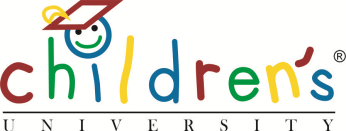
All of the schools in the Woodland Academy Trust are part of London South East Children’s University, an award programme that encourages children to get involved in lots of exciting activities and experiences in their local area. All school sites are recognised Learning Destinations, and all of our extra-curricular clubs are validated through Children’s University.
In Key Stage 2, children will receive their own Passport to Learning and gain a stamp for every hour of activity completed at a validated Learning Destination, as they work towards their Children’s University Award, Certificate, Diploma, Degree and eventually Fellowship. At the end of each year, children who have earned enough stamps are invited to a special university-style graduation ceremony to celebrate their success!
There are lots of Learning Destinations that have already signed up to the London South East Children’s University, from kayaking on Danson Lake to following in the footsteps of Charles Darwin at Down House, with plenty more places and activities looking to get involved.
